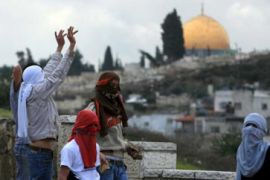Jerusalem: A divided city
Jacky Rowland on the city claimed by Palestinians and Israelis as their capital.

 |
| Jerusalem is a holy site for both Jews and Muslims [AFP] |
Forty years ago Israeli troops and tanks reshaped the map of Jerusalem – occupying and annexing the East of the city.
Until the 1967 war East Jerusalem had been under Jordanian control but in the west of the city the Jewish state had already declared Jerusalem its capital and made it the seat of its parliament.
At the heart of that claim is the western wall – the ruin of the second Jewish Temple – the most sacred building in Judaism.
Four decades on and Israel still celebrates what it calls 40 years of re-unification – although most of the world sees it as four decades of illegal occupation.
Celebrations
Israel’s celebrations began last month with a pledge from the Ehud Olmert, the Israeli prime minister, himself a former mayor of Jerusalem.
| Special report | ||||
|
|
“The past 40 years are only the beginning. I belive, hope and pray that we will continue to work together for Jersualem,” he declared.
“To expand its borders, to cultivate its foundations, to build its neighbourhoods, to maintain its beauty and take care of its future.”
But Israel fears a growing Arab population will undermine those dreams.
And in an attempt to build up the Jewish population the government has allocated nearly $1.5bn to develop Jewish areas of Jerusalem and strengthen Israel’s claim to the entire city.
Hopes and dreams
East Jerusalem is home to a quarter of a million Arabs who view it as the capital of any future Palestinian state, the city they have called home for centuries and home to the al Asqa Mosque as well as the Church of the Holy Sepulchre -one of the holiest sites in Christianity.
 |
| Forty years on, and East Jerusalem is still under occupation [AFP] |
Palestinians see a resolution to its occupation as essential to any peace talks.
Yasser Arafat, the former Palestinian leader, said in September 2000:
“We remain committed to our national rights over East Jerusalem capital of our state and shelter of our sacred sites, as well as our rights on the Christian and Islamic holy sites maintaining that the city should be accessible to all.”
For the moment, that accessibilty remains a distant dream and in the meantime the Arab population of the city continues to suffer.
The Red Cross has accused Israel of using its occupation to futher its own interests to the detriment of the occupied population and being responsible for a general disregard for its obligations under international humanitarian law.
